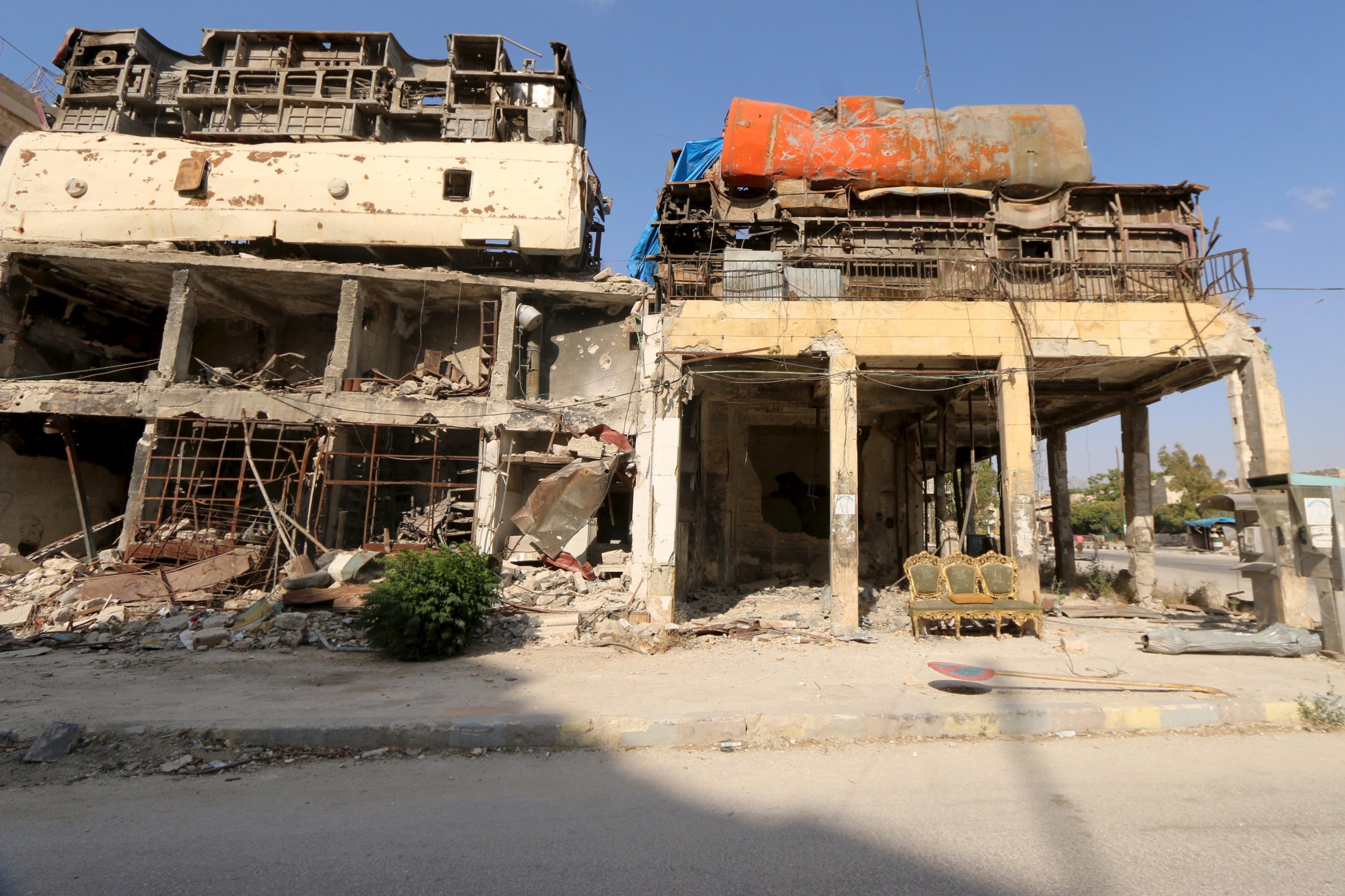


A major offensive by Hayat Tahrir al-Sham (HTS) and thousands of insurgents has breached Aleppo's western edge, marking the most intense violence in northwestern Syria since 2020. The attack has caused widespread displacement and disrupted services, with experts warning of potential destabilization in the region. Iran's involvement in Syria has been challenged by intensified Israeli strikes, while Turkey has reportedly supported the insurgents with strategic aid. This latest development has raised fears of prolonged instability and a potential impact on neighboring countries and ongoing humanitarian efforts in the conflict-torn region.
Syria Conflict: HTS Offensive and Regional Implications
Background
Syria has been embroiled in a devastating civil war since 2011, pitting the government forces against rebel groups and extremist organizations. The conflict has claimed hundreds of thousands of lives, displaced millions, and left the country in ruins.
Hayat Tahrir al-Sham (HTS), formerly known as Jabhat al-Nusra, is an Islamist militant group that emerged as a major force in the Syrian conflict. HTS controls large parts of Idlib province in northwestern Syria, which has become the last major rebel stronghold in the country.
Recent Offensive
On January 20, 2023, HTS and thousands of insurgents launched a major offensive against government-held areas on the western edge of Aleppo. The attack marks the most intense violence in northwestern Syria since 2020.
The offensive has caused widespread displacement, with tens of thousands of civilians fleeing their homes. Essential services, including electricity and water supply, have been disrupted. Experts fear that the violence could destabilize the region and fuel further humanitarian suffering.
External Involvement
The Syrian conflict has drawn the attention of regional and international powers. Iran has been a key supporter of the Syrian government, providing military and financial assistance. In response, Israel has intensified its airstrikes against Iranian targets in Syria.
Turkey, on the other hand, has reportedly supported the insurgents in northwestern Syria with strategic aid. Turkey's role in the conflict is complex, as it seeks to balance its own interests with international pressure to resolve the crisis.
Concerns and Implications
The latest developments in the Syrian conflict raise fears of prolonged instability and a potential impact on neighboring countries. The violence could exacerbate the humanitarian crisis in the region, and there are concerns that it could destabilize Lebanon and Jordan, which host large numbers of Syrian refugees.
The conflict also poses a threat to ongoing humanitarian efforts. Aid organizations are struggling to reach civilians trapped in conflict zones, and the violence is hindering their operations.
Top FAQs

In a tense meeting at the White House, President Donald Trump urged Ukrainian President Volodymyr Zelensky to accept Russian President Vladimir Putin's terms for ending the two-year war in Ukraine. Despite seeking more military support from the US, Zelensky was met with resistance from Trump, who reportedly engaged in a "screaming match" with the Ukrainian leader. The US leader even claimed that Putin saw the conflict as a "special operation" rather than a full-fledged war, further complicating negotiations between the two nations.

As Liverpool struggled to find their form in a tough game against Manchester United, Dutch midfielder Cody Gakpo stood out with his sharp attack and strong composure. Despite hitting the woodwork three times, Gakpo managed to score a brilliant equalizer for his team, showcasing his potential and talent on the field. While Liverpool may have lost the match, Gakpo's impressive performance provided a glimmer of hope for a struggling team.

Ayodhya's Deepotsav 2025 was a shining example of faith, community, and innovation as the city set two new world records with over 26 lakh diyas and a grand aarti performed by 2,100 priests. The event, witnessed by Chief Minister Yogi Adityanath, also showcased a spectacular 3D projection mapping and drone light show that brought Lord Ram's story to life in the night sky. The event was a testament to the deep connection Ayodhya's youth have with Lord Ram's ideals and was made possible by the hard work of over 40 potter families and thousands of volunteers.

In a brazen and perfectly orchestrated robbery, a group of thieves infiltrated the world-famous Louvre Museum in Paris on Sunday morning and made off with a collection of priceless jewels with an estimated value in the millions. French officials confirmed the robbery and began a detailed investigation to determine how the culprits managed to evade the museum's advanced security systems and execute the crime in under seven minutes. This latest incident has raised serious concerns about the protection of national treasures at one of the world's most popular tourist destinations.

In an audacious heist, a group of armed thieves breached security at the iconic Louvre Museum in Paris and stole nine valuable jewels from the collection of Napoleon Bonaparte and Empress Joséphine. The robbery, which took place in just seven minutes, has prompted a full-scale police investigation and raised concerns about the museum's security. French officials are working to recover the stolen items, but the Louvre remains closed to visitors.

Despite a ceasefire in early October, the conflict between Israel and Palestine shows no signs of abating, with reports of ongoing deadly clashes and Israeli tank fire targeting a car in Gaza City. The closure of the Rafah border crossing to Egypt, citing Hamas's failure to retrieve bodies, has further exacerbated tensions. However, experts warn of the uncertain future for a transitional government in Gaza and the risk of breaching the fragile ceasefire. The violence and closure highlight the ongoing humanitarian crisis and the need for both sides to engage in peaceful negotiations.

Hundreds of travellers heading to India from Italy for Diwali were left stranded after Air India cancelled its Milan-Delhi flight due to a technical issue. The sudden breakdown of the flight raised concerns about making it home in time for the festival. Some passengers even face the prospect of celebrating Diwali away from home due to rebookings on alternate flights. Air India assured that they are prioritising passenger safety and comfort while providing necessary support to those affected.

On day 1,312 of Russia's war on Ukraine, tensions continue to escalate as Ukrainian drones target a Russian oil pumping station, Russian forces seize three more villages in eastern Ukraine, and NATO increases its presence in the Baltic Sea region. In response to the ongoing conflict, the Ukrainian security service reports that the SBU caused a fire and halted operations in the Chuvashia region, while Russia's military announced its continued advance in Donetsk and Dnipro. Meanwhile, NATO's decision to deploy additional military assets comes after several days of unidentified drone sightings in Denmark and at military bases.

The upcoming India-Australia ODI series has drawn attention for multiple reasons, including the successful return of Rohit Sharma and Virat Kohli as white-ball players. Despite being relieved of captaincy, the duo is expected to continue playing in the format until the 2027 World Cup, according to Australia's Travis Head and India's Axar Patel. As both teams gear up for a high-stakes clash, the focus remains on the future of these two icons and their potential to lead India to another ODI World Cup victory.

Pakistani security forces have thwarted a suicide attack targeting their camp in Mir Ali, North Waziristan, after a vehicle loaded with explosives was driven into the perimeter wall. In a separate operation, 34 militants described as "India-backed terrorists" were killed in multiple engagements across Khyber Pakhtunkhwa. These operations form part of Pakistan's continued efforts to eliminate foreign-sponsored terrorism from the country under the vision "Azm-e-Istehkam."